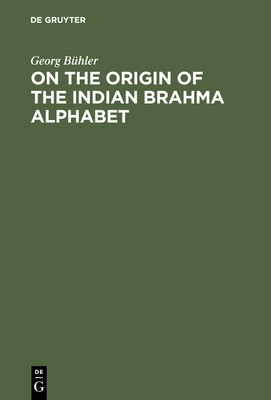
- We will send in 10–14 business days.
- Author: Georg Bühler
- Publisher: Walter de Gruyter
- Year: 2016
- Pages: 136
- ISBN-10: 3111258416
- ISBN-13: 9783111258416
- Format: 15.6 x 23.4 x 1 cm, hardcover
- Language: English
- SAVE -10% with code: EXTRA
Reviews
Description
Excerpt from On the Origin of the Indian Brahma Alphabet
As the few separate copies of the Indian Studies No. III, struck off in 1895, were sold very soon and rather numerous requests for additional ones were addressed both to me and to the bookseller of the Imperial Academy, Messrs. Carl Gerold's Sohn, I asked the Academy for permission to issue a second edition, which Mr. Karl J. Trubner had consented to publish. My petition was readily granted. In addition Messrs. von Holder, the publishers of the Wiener Zeitschrift fur die Kunde des Morgenlandes, kindly allowed me to reprint my article on the origin of the Kharosthi, which had appeared in vol. IX of that Journal and is now given in Appendix I. To these two sections I have added, in Appendix II, a brief review of the arguments for Dr. Burnell's hypothesis, which derives the so-called letter-numerals or numerical symbols of the Brahma alphabet from the ancient Egyptian numeral signs, together with a third comparative table, in order to include in this volume all those points, which require fuller discussion, and in order to make it a serviceable companion to the palaeography of the Grundriss. The chapters on the Brahmi and the Kharosthi have been throughout revised and the first has been changed most. A new comparative table of the Semitic and Brahma signs, the same as has been used for the Grundriss, has been given.
About the Publisher
Forgotten Books publishes hundreds of thousands of rare and classic books. Find more at www.forgottenbooks.com
This book is a reproduction of an important historical work. Forgotten Books uses state-of-the-art technology to digitally reconstruct the work, preserving the original format whilst repairing imperfections present in the aged copy. In rare cases, an imperfection in the original, such as a blemish or missing page, may be replicated in our edition. We do, however, repair the vast majority of imperfections successfully; any imperfections that remain are intentionally left to preserve the state of such historical works."
EXTRA 10 % discount with code: EXTRA
The promotion ends in 18d.20:07:28
The discount code is valid when purchasing from 10 €. Discounts do not stack.
- Author: Georg Bühler
- Publisher: Walter de Gruyter
- Year: 2016
- Pages: 136
- ISBN-10: 3111258416
- ISBN-13: 9783111258416
- Format: 15.6 x 23.4 x 1 cm, hardcover
- Language: English English
Excerpt from On the Origin of the Indian Brahma Alphabet
As the few separate copies of the Indian Studies No. III, struck off in 1895, were sold very soon and rather numerous requests for additional ones were addressed both to me and to the bookseller of the Imperial Academy, Messrs. Carl Gerold's Sohn, I asked the Academy for permission to issue a second edition, which Mr. Karl J. Trubner had consented to publish. My petition was readily granted. In addition Messrs. von Holder, the publishers of the Wiener Zeitschrift fur die Kunde des Morgenlandes, kindly allowed me to reprint my article on the origin of the Kharosthi, which had appeared in vol. IX of that Journal and is now given in Appendix I. To these two sections I have added, in Appendix II, a brief review of the arguments for Dr. Burnell's hypothesis, which derives the so-called letter-numerals or numerical symbols of the Brahma alphabet from the ancient Egyptian numeral signs, together with a third comparative table, in order to include in this volume all those points, which require fuller discussion, and in order to make it a serviceable companion to the palaeography of the Grundriss. The chapters on the Brahmi and the Kharosthi have been throughout revised and the first has been changed most. A new comparative table of the Semitic and Brahma signs, the same as has been used for the Grundriss, has been given.
About the Publisher
Forgotten Books publishes hundreds of thousands of rare and classic books. Find more at www.forgottenbooks.com
This book is a reproduction of an important historical work. Forgotten Books uses state-of-the-art technology to digitally reconstruct the work, preserving the original format whilst repairing imperfections present in the aged copy. In rare cases, an imperfection in the original, such as a blemish or missing page, may be replicated in our edition. We do, however, repair the vast majority of imperfections successfully; any imperfections that remain are intentionally left to preserve the state of such historical works."


Reviews